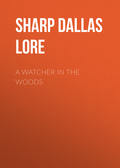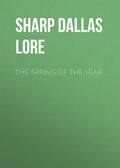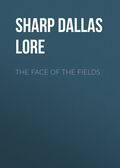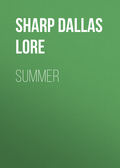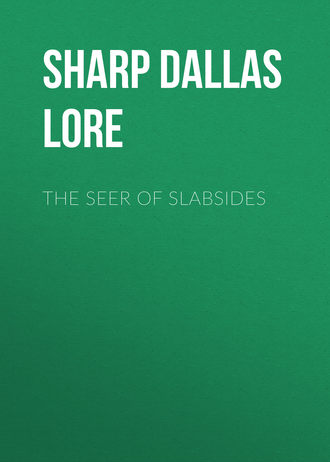
Sharp Dallas Lore
The Seer of Slabsides
During the days when the deadening might have occurred, John Burroughs was teaching school. Then he became a United States bank examiner, and only after that returned to the country – to Riverby and Slabsides, and Woodchuck Lodge, – to live out the rest of his years, years as full of life and books as his vines along the Hudson are full of life and grapes.
Could it be otherwise? If men and grapes are of the same divine dust, should they not grow according to the same divine laws? Here in the vineyard along the Hudson, John Burroughs planted himself in planting his vines, and every trellis that he set has become his own support and stay. The very clearing of the land for his vineyard was a preparation of himself physically and morally for a more fruitful life.
"Before the snow was off in March," he says in "Literary Values," "we set to work under-draining the moist and springy places. My health and spirits improved daily. I seemed to be under-draining my own life and carrying off the stagnant water, as well as that of the land." And so he was. There are other means of doing it – taking drugs, playing golf, walking the streets; but surely the advantages and the poetry are all in favor of the vineyard. And how much fitter a place the vineyard to mellow and ripen life, than a city roof of tarry pebbles and tin!
Though necessarily personal and subjective, John Burroughs's writing is entirely free from self-exploitation and confession. There are pages scattered here and there dealing briefly and frankly with his own natural history, but our thanks are due to John Burroughs that he never made a business of watching himself. Once he was inveigled by a magazine editor into doing "An Egotistical Chapter," wherein we find him as a boy of sixteen reading essays, and capable at that age of feeding for a whole year upon Dr. Johnson! Then we find him reading Whipple's essays, and the early outdoor papers of Higginson; and later, at twenty-three, settling down with Emerson's essays, and getting one of his own into the "Atlantic Monthly."
How early his own began to come to him!
That first essay in the "Atlantic" was followed by a number of outdoor sketches in the New York "Leader" – written, Burroughs says, "mainly to break the spell of Emerson's influence and get upon ground of my own." He succeeded in both purposes; and a large and exceedingly fertile piece of ground it proved to be, too, this which he got upon! Already the young writer had chosen his field and his crop. The out-of-doors has been largely his literary material, as the essay has been largely his literary form, ever since. He has done other things – volumes of literary studies and criticisms; but his theme from first to last has been the Great Book of Nature, a page of which, here and there, he has tried to read to us.
Burroughs's work, in outdoor literature, is a distinct species, with new and well-marked characteristics. He is the nature-writer, to be distinguished from the naturalist in Gilbert White, the mystic in Traherne, the philosopher in Emerson, the preacher, poet, critic in Thoreau, the humorist in Charles Dudley Warner. As we now know the nature-writer we come upon him for the first time in John Burroughs. Such credit might have gone to Thomas Wentworth Higginson, had he not been something else before he was a lover of nature – of letters first, then of flowers, carrying his library into the fields; whereas Burroughs brings the fields into the library. The essay whose matter is nature, whose moral is human, whose manner is strictly literary, belongs to John Burroughs. His work is distinguished by this threefold and even emphasis. In almost every other of our early outdoor writers either the naturalist or the moralist or the stylist holds the pen.
Early or late, this or that, good outdoor writing must be marked, first, by fidelity to fact; and, secondly, by sincerity of expression. Like qualities mark all good literature; but they are themselves the very literature of nature. When we take up a nature-book we ask (and it was Burroughs who taught us to ask), "Is the record true? Is the writing honest?"
In these many volumes by John Burroughs there are many observations, and it is more than likely that some of them may be wrong, but it is not possible that any of them could be mixed with observations that Burroughs knows he never made. If Burroughs has written a line of sham natural history, which line is it? In a preface to "Wake-Robin," the author says his readers have sometimes complained that they do not see the things which he sees in the woods; but I doubt if there ever was a reader who suspected John Burroughs of not seeing the things.
His reply to these complaints is significant, being in no manner a defense, but an exquisite explanation, instead, of the difference between the nature which anybody may see in the woods and the nature that every individual writer, because he is a writer, and an individual, must put into his book: a difference like that between the sweet-water gathered by the bee from the flowers and the drop of acid-stung honey deposited by the bee in the comb. The sweet-water undergoes a chemical change in being brought to the hive, as the wild nature undergoes a literary change – by the addition of the writer's self to the nature, while with the sweet-water it is by the addition of the bee.
One must be able to walk to an editorial office and back, and all the way walk humbly with his theme, as Burroughs ever does – not entirely forgetful of himself, nor of me (because he has invited me along); but I must be quiet and not disturb the fishing – if we go by way of a trout-stream.
True to the facts, Burroughs is a great deal more than scientific, for he loves the things – the birds, hills, seasons – as well as the truths about them; and true to himself, he is not by any means a simple countryman who has never seen the city, a natural idyl, who lisps in books and essays, because the essays come. He is fully aware of the thing he wants to do, and by his own confession has a due amount of trouble shaping his raw material into finished literary form. He is quite in another class from the authors of "The Complete Angler" and "New England's Rarities Discovered." In Isaak Walton, to quote Leslie Stephen, "a happy combination of circumstances has provided us with a true country idyl, fresh and racy from the soil, not consciously constructed by the most skillful artistic hand."
Now the skillful artistic hand is everywhere seen in John Burroughs. What writer in these days could expect happy combinations of circumstances in sufficient numbers for so many volumes?
But being an idyl, when you come to think of it, is not the result of a happy combination of circumstances, but rather of stars – of horoscope. You are born an idyl or you are not, and where and when you live has nothing to do with it.
Who would look for a true country idyl to-day in the city of Philadelphia? Yet one came out of there yesterday, and lies here open before me, on the table. It is a slender volume, called "With the Birds, An Affectionate Study," by Caroline Eliza Hyde. The author is discussing the general subject of nomenclature and animal distribution, and says:
"When the Deluge covered the then known face of the earth, the birds were drowned with every other living thing, except those that Noah, commanded by God, took two by two into the Ark.
"When I reflect deeply and earnestly about the Ark, as every one should, thoughts crowd my mind with an irresistible force."
[And they crowd my mind, too.]
"Noah and his family had preserved the names of the birds given them by Adam. This is assured, for Noah sent a raven and a dove out to see if the waters had abated, and we have birds of that name now. Nothing was known of our part of the globe, so these birds must have remained in the Holy Land for centuries. We do not hear of them until America was discovered…
"Bats come from Sur. They are very black mouse-like birds, and disagreeable… The bobolink is not mentioned in the Bible, but it is doubtless a primitive bird. The cock that crows too early in the morning … can hardly be classed with the song-birds. The name of the humming-bird is not mentioned in the Bible, but as there is nothing new under the sun, he is probably a primitive bird."
Burroughs would have agreed that the humming-bird is probably a primitive bird; and also that this is a true idyl, and that he could not write a true idyl if he tried. No one could write like that by trying. And what has any happy combination of circumstances to do with it? No, a book essentially is only a personality in type, and he who would not be frustrated of his hope to write a true idyl must himself be born a true idyl. A fine Miltonic saying!



